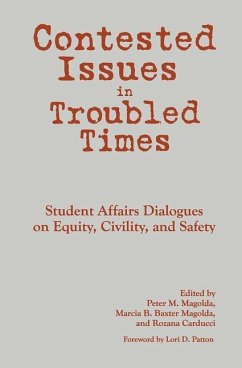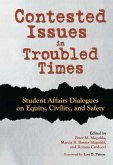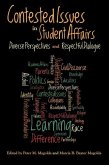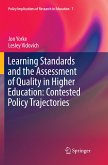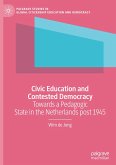Contested Issues in Troubled Times
Student Affairs Dialogues on Equity, Civility, and Safety
Herausgeber: Magolda, Peter M; Carducci, Rozana; Magolda, Marcia B Baxter
Contested Issues in Troubled Times
Student Affairs Dialogues on Equity, Civility, and Safety
Herausgeber: Magolda, Peter M; Carducci, Rozana; Magolda, Marcia B Baxter
- Gebundenes Buch
- Merkliste
- Auf die Merkliste
- Bewerten Bewerten
- Teilen
- Produkt teilen
- Produkterinnerung
- Produkterinnerung
Provides student affairs educators with frameworks to constructively think about and navigate the contentious climate they are increasingly encountering on campus. The 54 contributors to this volume address how we create an equitable climate conducive to learning in a dynamic environment fraught with complexity.
Andere Kunden interessierten sich auch für
![Contested Issues in Troubled Times Contested Issues in Troubled Times]() Contested Issues in Troubled Times54,99 €
Contested Issues in Troubled Times54,99 €![International Dimensions and Trends in Higher Education in Troubled Times International Dimensions and Trends in Higher Education in Troubled Times]() International Dimensions and Trends in Higher Education in Troubled Times220,99 €
International Dimensions and Trends in Higher Education in Troubled Times220,99 €![Contested Issues in Student Affairs Contested Issues in Student Affairs]() Contested Issues in Student Affairs51,99 €
Contested Issues in Student Affairs51,99 €![Harvard Lights and Shadows: College Sketches in War Times Harvard Lights and Shadows: College Sketches in War Times]() Victor RineHarvard Lights and Shadows: College Sketches in War Times34,99 €
Victor RineHarvard Lights and Shadows: College Sketches in War Times34,99 €![Learning Standards and the Assessment of Quality in Higher Education: Contested Policy Trajectories Learning Standards and the Assessment of Quality in Higher Education: Contested Policy Trajectories]() Jon YorkeLearning Standards and the Assessment of Quality in Higher Education: Contested Policy Trajectories38,99 €
Jon YorkeLearning Standards and the Assessment of Quality in Higher Education: Contested Policy Trajectories38,99 €![Civic Education and Contested Democracy Civic Education and Contested Democracy]() Wim de JongCivic Education and Contested Democracy106,99 €
Wim de JongCivic Education and Contested Democracy106,99 €![The Life and Times of Anthony Wood, Antiquary of Oxford, 1632-1695; 5 The Life and Times of Anthony Wood, Antiquary of Oxford, 1632-1695; 5]() Anthony À. WoodThe Life and Times of Anthony Wood, Antiquary of Oxford, 1632-1695; 543,99 €
Anthony À. WoodThe Life and Times of Anthony Wood, Antiquary of Oxford, 1632-1695; 543,99 €-
-
-
Provides student affairs educators with frameworks to constructively think about and navigate the contentious climate they are increasingly encountering on campus. The 54 contributors to this volume address how we create an equitable climate conducive to learning in a dynamic environment fraught with complexity.
Hinweis: Dieser Artikel kann nur an eine deutsche Lieferadresse ausgeliefert werden.
Hinweis: Dieser Artikel kann nur an eine deutsche Lieferadresse ausgeliefert werden.
Produktdetails
- Produktdetails
- Verlag: Taylor & Francis
- Seitenzahl: 540
- Erscheinungstermin: 11. März 2019
- Englisch
- Abmessung: 231mm x 155mm x 38mm
- Gewicht: 885g
- ISBN-13: 9781620368008
- ISBN-10: 1620368005
- Artikelnr.: 54927552
- Herstellerkennzeichnung
- Libri GmbH
- Europaallee 1
- 36244 Bad Hersfeld
- gpsr@libri.de
- Verlag: Taylor & Francis
- Seitenzahl: 540
- Erscheinungstermin: 11. März 2019
- Englisch
- Abmessung: 231mm x 155mm x 38mm
- Gewicht: 885g
- ISBN-13: 9781620368008
- ISBN-10: 1620368005
- Artikelnr.: 54927552
- Herstellerkennzeichnung
- Libri GmbH
- Europaallee 1
- 36244 Bad Hersfeld
- gpsr@libri.de
Peter M. Magolda was Professor Emeritus in the Department of Educational Leadership at Miami University. He focused his scholarship on ethnographic studies of college students, critical issues in qualitative research, and program evaluation. He is author of The Lives of Campus Custodians and co-author of Contested Issues in Student Affairs, Contested Issues in Troubled Times, and It's All About Jesus!: Faith as an Oppositional Collegiate Subculture, and has served on the editorial boards of Research in Higher Education and the Journal of Educational Research. He was an ACPA Senior Scholar inductee, and in 2013 received the Association for the Study of Higher Education (ASHE) Mentoring Award. He also received Miami University's Richard Delp Outstanding Faculty Member award, as well Alumni Award from The Ohio State University and Indiana University. We deeply mourn the loss of author, teacher, and friend Peter M. Magolda. Marcia B. Baxter Magolda is Distinguished Professor Emerita, Miami University of Ohio and a nationally recognized author and speaker on student development and learning. She received the American College Personnel Association's Lifetime Achievement Award in 2014, and the Association for the Study of Higher Education's Research Achievement Award in 2007, for her outstanding contribution to advancing student learning. Her scholarship addresses the evolution of learning and development in college and subsequent adult life, and educational practice to promote self-authorship. Her seventh and eighth books respectively are Authoring Your Life and Development and Assessment of Self-Authorship. Rozana Carducci is the graduate director of the Master of Arts in Higher Education Program at Elon University.She was previously at Salem State University in Salem, Massachusetts, where she served as assistant professor in the Department of Secondary and Higher Education and coordinator of the Higher Education in Student Affairs graduate program. Ahe ha
Foreword-Lori D. Patton Preface-Peter M. Magolda, Marcia B. Baxter Magolda, and Rozana Carducci Acknowledgments Companion Social Media Opportunities-Nick Rathbone Part One. Introduction 1. Why Is It So Hard for the Student Affairs Profession to Foster Inclusive Environments for Learning?
Bonding and Bridging for Community and Democracy-Penny Rue
History Matters. Against Romanticizing Student Affairs' Role in Inclusion-Dafina-Lazarus (D-L. Stewart 2. How Do Student Affairs Educators Help Students Learn to Engage Productively in Difficult Dialogue?
Learning Dialogic Skills for Effective Campus Conversations-Kelly E. Maxwell and Monita C. Thompson
Systemic Integration of Dialogic Skills. An Opportunity for Student Affairs/Academic Affairs Partnerships-Jeannie Brown Leonard Part Two. Cultivating Inclusive Learning Environments. Equity, Civility and Safety 3. How Should Institutions Address Student Demands Related to Campus Racial Climate?
To Address Today's Student Demands for Racial Justice, Institutions Must Shift From Multiculturalism to Polyculturalism-Ajay Nair
Critical Considerations in Advancing Social Justice Agendas in Higher Education-Samuel D. Museus 4. What Are the Responsibilities and Limits of Student Affairs' Roles in Preparing Students for Political Activism?
Student Affairs Educators' Brokering Role in Political Activism-Sandra Rodríguez
Brokering Students' Political Activism. Expanding Student Affairs Professionals' Views-Cassie L. Barnhardt 5. What Does It Mean for Student Affairs Educators to Establish Safe and Just Responses to Campus Sexual Violence?
Moving Beyond Policy to Address Campus Sexual Violence-Chris Linder
Abating Campus Sexual Violence Requires a Multifaceted Approach-Frank Shushok Jr. 6. How Do Student Affairs Educators Navigate the Tension Between the First Amendment Right to Free Speech and the Expression of Ideas That Create a Hostile Campus Climate?
Free Expression, Civic Education, and Inclusive Campuses-Rafael E. Alvarado
Balancing Free Speech and Inclusive Campus Environments. A Worthy Yet Complicated Commitment-Naomi Daradar Sigg 7. How Should Institutions Redefine and Measure Student Success?
Student Success as Liberal Education Escapes Definition and Measurement-Laura Elizabeth Smithers
Redefining Student Success to Foster More Inclusive Learning Environments-Molly Reas Hall 8. What Are the Risks of Assuming the Sharing of Proper Pronouns Is a Best Practice for Trans* Inclusion?
More Than Pronouns. Problematizing Best Practices of Trans* Inclusion-Kathryn S. Jaekel and D. Chase J. Catalano
What Happens to a Dream Deferred?. Sharing Proper Pronouns as an Act of Gender Self-Determination-Z Nicolazzo 9. How Should Institutions Support Students With Marginalized Identities? What Practices Are Essential for the Establishment of Safe and Inclusive Learning Environments?
What is Equitable?-Engaging the Four Is of Oppression to Support Students of Color-Jonathan A. McElderry and Stephanie Hernandez Rivera
Intersectionality, Culture, and Mentoring. Critical Needs for Student Affairs Educators-Julie A. Manley White 10. What Role Should Student Affairs Educators Play in Supporting Undocumented Students in the Current Political Climate?
Confronting Anti-Immigration Rhetoric on Campus. A Student Affairs Imperative-Susana M. Muñoz
Emphasizing Institution-Wide Strategies to Support Undocumented Students in Higher Education-Maria Sanchez Luna and Mei-Yen Ireland 11. How Does Social Class Influence Student Learning and the Work of Student Affairs Educators?
Social Class Complexities in Curricular and Cocurricular Learning. Options Do Not Mean Access-Sonja Ardoin
Disrupting Educational Privilege. Partnering With Students and Communities to Create True Inclusion-Angela Cook 12. What Is the Role of Student Affairs Educators in Helping Students Whose Learning Is Complicated by Experiencing Trauma?
Navigating the Complex Space of Supporting Student Survivors of Trauma-Tricia R. Shalka
A Focus on Relational and Narrative Aspects of Trauma. Challenges and Opportunities for Higher Education-Kelli D. Zaytoun 13. Why Is Religion a Difficult Issue In American Higher Education and How Should Student Affairs Respond?
Balancing Competing Interests Through Principled Practice-P. Jesse Rine and Brian D. Reed
Supporting Interfaith Climates and Outcomes. Considerations and Practices for Student Affairs Educators-Benjamin S. Selznick 14. What Is the Student Affairs Educator's Role in Navigating Tensions Between Legislative Action and Institutional Policy?
From Guns to Transgender Students' Rights. When Policy and Personal Positions Do Not Align-Amelia Parnell and Jill Dunlap
Passion and Policy. How Student Affairs Educators Navigate Their Roles in the Face of Legislative Restrictions-R. Bradley Johnson Part Three. Cultivating Professional Capacities to Foster Inclusive Learning Environments 15. Given the Complexity Associated With Fostering Equitable, Civil, and Safe Learning Environments, How Should Graduate Preparation Programs Prepare Students to Work in Higher Education?
Advancing Power- and Identity-Conscious Student Affairs Graduate Programs-Rosemary J. Perez
A Systemic Approach to Enacting Equitable, Civil, and Safe Learning Environments-Jessica C. Harris 16. What Professional Development Opportunities Are Necessary to Ensure that Professionals Have the Capacities and Competencies to Make Good Decisions When Faced With the Unknown?
Trust Your Instincts, Pack a Compass, and Never Hike Alone-Cynthia H. Love
Professional Development as a Healing Community Practice-Michelle M. Espino 17. What Responsibility Does Student Affairs Have to Help Graduate Assistants Navigate the Ambiguity Between Their Student and Professional Roles?
Navigating Two Worlds. Supporting Graduate Students in Their Dual Roles as Students and Professionals-Jessica Gunzburger
Caught in the Middle. A Stable Anchor for Graduate Students Amid a Discursive Struggle-Hoa Bui 18. How Should Student Affairs Professional Preparation Programs Address Discrimination and Bias in the Graduate Classroom?
No Struggle, No Progress. The Complexities of Pre-Tenure Minoritized Faculty Addressing Bias, Discrimination, and Oppression in Student Affairs Graduate Preparation Programs-David Pérez II
You Are Not Alone. Graduate Preparation Programs' Responsibility and Commitment to Addressing Discrimination and Bias in Classrooms and Beyond-Bridget Turner Kelly 19. What Is the Value of Student Affairs Research as It Relates to Issues of Equity, Civility, and Safety?
The Value and Disconnect of Student Affairs Research Related to Equity, Civility, and Safety-JoNes R. VanHecke
Considering the Practical Usefulness of Higher Education Research and Theory in Promoting Equity, Civility, and Safety-Nicholas A. Bowman 20. How Can/Should Student Affairs Educators Use Assessment to Improve Educational Practices Related to Equity, Civility, and Safety?
Using Deconstructed Assessment to Address Issues of Equity, Civility, and Safety on College Campuses-Gavin W. Henning
Assessment as Power. Using Our Privilege to Center the Student Voice-Abby C. Trout 21. What Would It Take for Student Affairs Educators to Facilitate a Personal Learning Design Approach That Enhances Equity, Civility, and Safety?
Pursuing Equity, Civility, and Safety Through Personal Learning Design-Taran Cardone
A Personal Learning Design Approach. Are Student Affairs Educators Ready?-Matthew R. Johnson 22. How Do Student Affairs Educators Integrate Personal and Professional Identities in Digital Spaces/Social Media?
Orchestrated in Harmony or Forced With a Disconnect-Josie Ahlquist
Speaking Up. How Student Affairs Professionals of Color Navigate Social Media with Authenticity-Julia R. Golden 23. What Does It Mean for Student Affairs Educators to Maintain Self-Care in Turbulent Times?
Practicing Self-Care Is a Radical Notion in Student Affairs and It Shouldn't Be-Tiffany J. Davis
More Than Consumption. Creating Space for Self-Care in Higher Education-Shamika N. Karikari Part Four. Epilogue 24. What Is the Promise/Potential of the Student Affairs Profession to Foster Inclusive Environments for Learning?
Putting Potential to Work-Susan R. Jones
It's the Means, Not the Ends. Incorporating Humanity Into Our Practice-Craig R. Berger Contributors Index
Bonding and Bridging for Community and Democracy-Penny Rue
History Matters. Against Romanticizing Student Affairs' Role in Inclusion-Dafina-Lazarus (D-L. Stewart 2. How Do Student Affairs Educators Help Students Learn to Engage Productively in Difficult Dialogue?
Learning Dialogic Skills for Effective Campus Conversations-Kelly E. Maxwell and Monita C. Thompson
Systemic Integration of Dialogic Skills. An Opportunity for Student Affairs/Academic Affairs Partnerships-Jeannie Brown Leonard Part Two. Cultivating Inclusive Learning Environments. Equity, Civility and Safety 3. How Should Institutions Address Student Demands Related to Campus Racial Climate?
To Address Today's Student Demands for Racial Justice, Institutions Must Shift From Multiculturalism to Polyculturalism-Ajay Nair
Critical Considerations in Advancing Social Justice Agendas in Higher Education-Samuel D. Museus 4. What Are the Responsibilities and Limits of Student Affairs' Roles in Preparing Students for Political Activism?
Student Affairs Educators' Brokering Role in Political Activism-Sandra Rodríguez
Brokering Students' Political Activism. Expanding Student Affairs Professionals' Views-Cassie L. Barnhardt 5. What Does It Mean for Student Affairs Educators to Establish Safe and Just Responses to Campus Sexual Violence?
Moving Beyond Policy to Address Campus Sexual Violence-Chris Linder
Abating Campus Sexual Violence Requires a Multifaceted Approach-Frank Shushok Jr. 6. How Do Student Affairs Educators Navigate the Tension Between the First Amendment Right to Free Speech and the Expression of Ideas That Create a Hostile Campus Climate?
Free Expression, Civic Education, and Inclusive Campuses-Rafael E. Alvarado
Balancing Free Speech and Inclusive Campus Environments. A Worthy Yet Complicated Commitment-Naomi Daradar Sigg 7. How Should Institutions Redefine and Measure Student Success?
Student Success as Liberal Education Escapes Definition and Measurement-Laura Elizabeth Smithers
Redefining Student Success to Foster More Inclusive Learning Environments-Molly Reas Hall 8. What Are the Risks of Assuming the Sharing of Proper Pronouns Is a Best Practice for Trans* Inclusion?
More Than Pronouns. Problematizing Best Practices of Trans* Inclusion-Kathryn S. Jaekel and D. Chase J. Catalano
What Happens to a Dream Deferred?. Sharing Proper Pronouns as an Act of Gender Self-Determination-Z Nicolazzo 9. How Should Institutions Support Students With Marginalized Identities? What Practices Are Essential for the Establishment of Safe and Inclusive Learning Environments?
What is Equitable?-Engaging the Four Is of Oppression to Support Students of Color-Jonathan A. McElderry and Stephanie Hernandez Rivera
Intersectionality, Culture, and Mentoring. Critical Needs for Student Affairs Educators-Julie A. Manley White 10. What Role Should Student Affairs Educators Play in Supporting Undocumented Students in the Current Political Climate?
Confronting Anti-Immigration Rhetoric on Campus. A Student Affairs Imperative-Susana M. Muñoz
Emphasizing Institution-Wide Strategies to Support Undocumented Students in Higher Education-Maria Sanchez Luna and Mei-Yen Ireland 11. How Does Social Class Influence Student Learning and the Work of Student Affairs Educators?
Social Class Complexities in Curricular and Cocurricular Learning. Options Do Not Mean Access-Sonja Ardoin
Disrupting Educational Privilege. Partnering With Students and Communities to Create True Inclusion-Angela Cook 12. What Is the Role of Student Affairs Educators in Helping Students Whose Learning Is Complicated by Experiencing Trauma?
Navigating the Complex Space of Supporting Student Survivors of Trauma-Tricia R. Shalka
A Focus on Relational and Narrative Aspects of Trauma. Challenges and Opportunities for Higher Education-Kelli D. Zaytoun 13. Why Is Religion a Difficult Issue In American Higher Education and How Should Student Affairs Respond?
Balancing Competing Interests Through Principled Practice-P. Jesse Rine and Brian D. Reed
Supporting Interfaith Climates and Outcomes. Considerations and Practices for Student Affairs Educators-Benjamin S. Selznick 14. What Is the Student Affairs Educator's Role in Navigating Tensions Between Legislative Action and Institutional Policy?
From Guns to Transgender Students' Rights. When Policy and Personal Positions Do Not Align-Amelia Parnell and Jill Dunlap
Passion and Policy. How Student Affairs Educators Navigate Their Roles in the Face of Legislative Restrictions-R. Bradley Johnson Part Three. Cultivating Professional Capacities to Foster Inclusive Learning Environments 15. Given the Complexity Associated With Fostering Equitable, Civil, and Safe Learning Environments, How Should Graduate Preparation Programs Prepare Students to Work in Higher Education?
Advancing Power- and Identity-Conscious Student Affairs Graduate Programs-Rosemary J. Perez
A Systemic Approach to Enacting Equitable, Civil, and Safe Learning Environments-Jessica C. Harris 16. What Professional Development Opportunities Are Necessary to Ensure that Professionals Have the Capacities and Competencies to Make Good Decisions When Faced With the Unknown?
Trust Your Instincts, Pack a Compass, and Never Hike Alone-Cynthia H. Love
Professional Development as a Healing Community Practice-Michelle M. Espino 17. What Responsibility Does Student Affairs Have to Help Graduate Assistants Navigate the Ambiguity Between Their Student and Professional Roles?
Navigating Two Worlds. Supporting Graduate Students in Their Dual Roles as Students and Professionals-Jessica Gunzburger
Caught in the Middle. A Stable Anchor for Graduate Students Amid a Discursive Struggle-Hoa Bui 18. How Should Student Affairs Professional Preparation Programs Address Discrimination and Bias in the Graduate Classroom?
No Struggle, No Progress. The Complexities of Pre-Tenure Minoritized Faculty Addressing Bias, Discrimination, and Oppression in Student Affairs Graduate Preparation Programs-David Pérez II
You Are Not Alone. Graduate Preparation Programs' Responsibility and Commitment to Addressing Discrimination and Bias in Classrooms and Beyond-Bridget Turner Kelly 19. What Is the Value of Student Affairs Research as It Relates to Issues of Equity, Civility, and Safety?
The Value and Disconnect of Student Affairs Research Related to Equity, Civility, and Safety-JoNes R. VanHecke
Considering the Practical Usefulness of Higher Education Research and Theory in Promoting Equity, Civility, and Safety-Nicholas A. Bowman 20. How Can/Should Student Affairs Educators Use Assessment to Improve Educational Practices Related to Equity, Civility, and Safety?
Using Deconstructed Assessment to Address Issues of Equity, Civility, and Safety on College Campuses-Gavin W. Henning
Assessment as Power. Using Our Privilege to Center the Student Voice-Abby C. Trout 21. What Would It Take for Student Affairs Educators to Facilitate a Personal Learning Design Approach That Enhances Equity, Civility, and Safety?
Pursuing Equity, Civility, and Safety Through Personal Learning Design-Taran Cardone
A Personal Learning Design Approach. Are Student Affairs Educators Ready?-Matthew R. Johnson 22. How Do Student Affairs Educators Integrate Personal and Professional Identities in Digital Spaces/Social Media?
Orchestrated in Harmony or Forced With a Disconnect-Josie Ahlquist
Speaking Up. How Student Affairs Professionals of Color Navigate Social Media with Authenticity-Julia R. Golden 23. What Does It Mean for Student Affairs Educators to Maintain Self-Care in Turbulent Times?
Practicing Self-Care Is a Radical Notion in Student Affairs and It Shouldn't Be-Tiffany J. Davis
More Than Consumption. Creating Space for Self-Care in Higher Education-Shamika N. Karikari Part Four. Epilogue 24. What Is the Promise/Potential of the Student Affairs Profession to Foster Inclusive Environments for Learning?
Putting Potential to Work-Susan R. Jones
It's the Means, Not the Ends. Incorporating Humanity Into Our Practice-Craig R. Berger Contributors Index
Foreword-Lori D. Patton Preface-Peter M. Magolda, Marcia B. Baxter Magolda, and Rozana Carducci Acknowledgments Companion Social Media Opportunities-Nick Rathbone Part One. Introduction 1. Why Is It So Hard for the Student Affairs Profession to Foster Inclusive Environments for Learning?
Bonding and Bridging for Community and Democracy-Penny Rue
History Matters. Against Romanticizing Student Affairs' Role in Inclusion-Dafina-Lazarus (D-L. Stewart 2. How Do Student Affairs Educators Help Students Learn to Engage Productively in Difficult Dialogue?
Learning Dialogic Skills for Effective Campus Conversations-Kelly E. Maxwell and Monita C. Thompson
Systemic Integration of Dialogic Skills. An Opportunity for Student Affairs/Academic Affairs Partnerships-Jeannie Brown Leonard Part Two. Cultivating Inclusive Learning Environments. Equity, Civility and Safety 3. How Should Institutions Address Student Demands Related to Campus Racial Climate?
To Address Today's Student Demands for Racial Justice, Institutions Must Shift From Multiculturalism to Polyculturalism-Ajay Nair
Critical Considerations in Advancing Social Justice Agendas in Higher Education-Samuel D. Museus 4. What Are the Responsibilities and Limits of Student Affairs' Roles in Preparing Students for Political Activism?
Student Affairs Educators' Brokering Role in Political Activism-Sandra Rodríguez
Brokering Students' Political Activism. Expanding Student Affairs Professionals' Views-Cassie L. Barnhardt 5. What Does It Mean for Student Affairs Educators to Establish Safe and Just Responses to Campus Sexual Violence?
Moving Beyond Policy to Address Campus Sexual Violence-Chris Linder
Abating Campus Sexual Violence Requires a Multifaceted Approach-Frank Shushok Jr. 6. How Do Student Affairs Educators Navigate the Tension Between the First Amendment Right to Free Speech and the Expression of Ideas That Create a Hostile Campus Climate?
Free Expression, Civic Education, and Inclusive Campuses-Rafael E. Alvarado
Balancing Free Speech and Inclusive Campus Environments. A Worthy Yet Complicated Commitment-Naomi Daradar Sigg 7. How Should Institutions Redefine and Measure Student Success?
Student Success as Liberal Education Escapes Definition and Measurement-Laura Elizabeth Smithers
Redefining Student Success to Foster More Inclusive Learning Environments-Molly Reas Hall 8. What Are the Risks of Assuming the Sharing of Proper Pronouns Is a Best Practice for Trans* Inclusion?
More Than Pronouns. Problematizing Best Practices of Trans* Inclusion-Kathryn S. Jaekel and D. Chase J. Catalano
What Happens to a Dream Deferred?. Sharing Proper Pronouns as an Act of Gender Self-Determination-Z Nicolazzo 9. How Should Institutions Support Students With Marginalized Identities? What Practices Are Essential for the Establishment of Safe and Inclusive Learning Environments?
What is Equitable?-Engaging the Four Is of Oppression to Support Students of Color-Jonathan A. McElderry and Stephanie Hernandez Rivera
Intersectionality, Culture, and Mentoring. Critical Needs for Student Affairs Educators-Julie A. Manley White 10. What Role Should Student Affairs Educators Play in Supporting Undocumented Students in the Current Political Climate?
Confronting Anti-Immigration Rhetoric on Campus. A Student Affairs Imperative-Susana M. Muñoz
Emphasizing Institution-Wide Strategies to Support Undocumented Students in Higher Education-Maria Sanchez Luna and Mei-Yen Ireland 11. How Does Social Class Influence Student Learning and the Work of Student Affairs Educators?
Social Class Complexities in Curricular and Cocurricular Learning. Options Do Not Mean Access-Sonja Ardoin
Disrupting Educational Privilege. Partnering With Students and Communities to Create True Inclusion-Angela Cook 12. What Is the Role of Student Affairs Educators in Helping Students Whose Learning Is Complicated by Experiencing Trauma?
Navigating the Complex Space of Supporting Student Survivors of Trauma-Tricia R. Shalka
A Focus on Relational and Narrative Aspects of Trauma. Challenges and Opportunities for Higher Education-Kelli D. Zaytoun 13. Why Is Religion a Difficult Issue In American Higher Education and How Should Student Affairs Respond?
Balancing Competing Interests Through Principled Practice-P. Jesse Rine and Brian D. Reed
Supporting Interfaith Climates and Outcomes. Considerations and Practices for Student Affairs Educators-Benjamin S. Selznick 14. What Is the Student Affairs Educator's Role in Navigating Tensions Between Legislative Action and Institutional Policy?
From Guns to Transgender Students' Rights. When Policy and Personal Positions Do Not Align-Amelia Parnell and Jill Dunlap
Passion and Policy. How Student Affairs Educators Navigate Their Roles in the Face of Legislative Restrictions-R. Bradley Johnson Part Three. Cultivating Professional Capacities to Foster Inclusive Learning Environments 15. Given the Complexity Associated With Fostering Equitable, Civil, and Safe Learning Environments, How Should Graduate Preparation Programs Prepare Students to Work in Higher Education?
Advancing Power- and Identity-Conscious Student Affairs Graduate Programs-Rosemary J. Perez
A Systemic Approach to Enacting Equitable, Civil, and Safe Learning Environments-Jessica C. Harris 16. What Professional Development Opportunities Are Necessary to Ensure that Professionals Have the Capacities and Competencies to Make Good Decisions When Faced With the Unknown?
Trust Your Instincts, Pack a Compass, and Never Hike Alone-Cynthia H. Love
Professional Development as a Healing Community Practice-Michelle M. Espino 17. What Responsibility Does Student Affairs Have to Help Graduate Assistants Navigate the Ambiguity Between Their Student and Professional Roles?
Navigating Two Worlds. Supporting Graduate Students in Their Dual Roles as Students and Professionals-Jessica Gunzburger
Caught in the Middle. A Stable Anchor for Graduate Students Amid a Discursive Struggle-Hoa Bui 18. How Should Student Affairs Professional Preparation Programs Address Discrimination and Bias in the Graduate Classroom?
No Struggle, No Progress. The Complexities of Pre-Tenure Minoritized Faculty Addressing Bias, Discrimination, and Oppression in Student Affairs Graduate Preparation Programs-David Pérez II
You Are Not Alone. Graduate Preparation Programs' Responsibility and Commitment to Addressing Discrimination and Bias in Classrooms and Beyond-Bridget Turner Kelly 19. What Is the Value of Student Affairs Research as It Relates to Issues of Equity, Civility, and Safety?
The Value and Disconnect of Student Affairs Research Related to Equity, Civility, and Safety-JoNes R. VanHecke
Considering the Practical Usefulness of Higher Education Research and Theory in Promoting Equity, Civility, and Safety-Nicholas A. Bowman 20. How Can/Should Student Affairs Educators Use Assessment to Improve Educational Practices Related to Equity, Civility, and Safety?
Using Deconstructed Assessment to Address Issues of Equity, Civility, and Safety on College Campuses-Gavin W. Henning
Assessment as Power. Using Our Privilege to Center the Student Voice-Abby C. Trout 21. What Would It Take for Student Affairs Educators to Facilitate a Personal Learning Design Approach That Enhances Equity, Civility, and Safety?
Pursuing Equity, Civility, and Safety Through Personal Learning Design-Taran Cardone
A Personal Learning Design Approach. Are Student Affairs Educators Ready?-Matthew R. Johnson 22. How Do Student Affairs Educators Integrate Personal and Professional Identities in Digital Spaces/Social Media?
Orchestrated in Harmony or Forced With a Disconnect-Josie Ahlquist
Speaking Up. How Student Affairs Professionals of Color Navigate Social Media with Authenticity-Julia R. Golden 23. What Does It Mean for Student Affairs Educators to Maintain Self-Care in Turbulent Times?
Practicing Self-Care Is a Radical Notion in Student Affairs and It Shouldn't Be-Tiffany J. Davis
More Than Consumption. Creating Space for Self-Care in Higher Education-Shamika N. Karikari Part Four. Epilogue 24. What Is the Promise/Potential of the Student Affairs Profession to Foster Inclusive Environments for Learning?
Putting Potential to Work-Susan R. Jones
It's the Means, Not the Ends. Incorporating Humanity Into Our Practice-Craig R. Berger Contributors Index
Bonding and Bridging for Community and Democracy-Penny Rue
History Matters. Against Romanticizing Student Affairs' Role in Inclusion-Dafina-Lazarus (D-L. Stewart 2. How Do Student Affairs Educators Help Students Learn to Engage Productively in Difficult Dialogue?
Learning Dialogic Skills for Effective Campus Conversations-Kelly E. Maxwell and Monita C. Thompson
Systemic Integration of Dialogic Skills. An Opportunity for Student Affairs/Academic Affairs Partnerships-Jeannie Brown Leonard Part Two. Cultivating Inclusive Learning Environments. Equity, Civility and Safety 3. How Should Institutions Address Student Demands Related to Campus Racial Climate?
To Address Today's Student Demands for Racial Justice, Institutions Must Shift From Multiculturalism to Polyculturalism-Ajay Nair
Critical Considerations in Advancing Social Justice Agendas in Higher Education-Samuel D. Museus 4. What Are the Responsibilities and Limits of Student Affairs' Roles in Preparing Students for Political Activism?
Student Affairs Educators' Brokering Role in Political Activism-Sandra Rodríguez
Brokering Students' Political Activism. Expanding Student Affairs Professionals' Views-Cassie L. Barnhardt 5. What Does It Mean for Student Affairs Educators to Establish Safe and Just Responses to Campus Sexual Violence?
Moving Beyond Policy to Address Campus Sexual Violence-Chris Linder
Abating Campus Sexual Violence Requires a Multifaceted Approach-Frank Shushok Jr. 6. How Do Student Affairs Educators Navigate the Tension Between the First Amendment Right to Free Speech and the Expression of Ideas That Create a Hostile Campus Climate?
Free Expression, Civic Education, and Inclusive Campuses-Rafael E. Alvarado
Balancing Free Speech and Inclusive Campus Environments. A Worthy Yet Complicated Commitment-Naomi Daradar Sigg 7. How Should Institutions Redefine and Measure Student Success?
Student Success as Liberal Education Escapes Definition and Measurement-Laura Elizabeth Smithers
Redefining Student Success to Foster More Inclusive Learning Environments-Molly Reas Hall 8. What Are the Risks of Assuming the Sharing of Proper Pronouns Is a Best Practice for Trans* Inclusion?
More Than Pronouns. Problematizing Best Practices of Trans* Inclusion-Kathryn S. Jaekel and D. Chase J. Catalano
What Happens to a Dream Deferred?. Sharing Proper Pronouns as an Act of Gender Self-Determination-Z Nicolazzo 9. How Should Institutions Support Students With Marginalized Identities? What Practices Are Essential for the Establishment of Safe and Inclusive Learning Environments?
What is Equitable?-Engaging the Four Is of Oppression to Support Students of Color-Jonathan A. McElderry and Stephanie Hernandez Rivera
Intersectionality, Culture, and Mentoring. Critical Needs for Student Affairs Educators-Julie A. Manley White 10. What Role Should Student Affairs Educators Play in Supporting Undocumented Students in the Current Political Climate?
Confronting Anti-Immigration Rhetoric on Campus. A Student Affairs Imperative-Susana M. Muñoz
Emphasizing Institution-Wide Strategies to Support Undocumented Students in Higher Education-Maria Sanchez Luna and Mei-Yen Ireland 11. How Does Social Class Influence Student Learning and the Work of Student Affairs Educators?
Social Class Complexities in Curricular and Cocurricular Learning. Options Do Not Mean Access-Sonja Ardoin
Disrupting Educational Privilege. Partnering With Students and Communities to Create True Inclusion-Angela Cook 12. What Is the Role of Student Affairs Educators in Helping Students Whose Learning Is Complicated by Experiencing Trauma?
Navigating the Complex Space of Supporting Student Survivors of Trauma-Tricia R. Shalka
A Focus on Relational and Narrative Aspects of Trauma. Challenges and Opportunities for Higher Education-Kelli D. Zaytoun 13. Why Is Religion a Difficult Issue In American Higher Education and How Should Student Affairs Respond?
Balancing Competing Interests Through Principled Practice-P. Jesse Rine and Brian D. Reed
Supporting Interfaith Climates and Outcomes. Considerations and Practices for Student Affairs Educators-Benjamin S. Selznick 14. What Is the Student Affairs Educator's Role in Navigating Tensions Between Legislative Action and Institutional Policy?
From Guns to Transgender Students' Rights. When Policy and Personal Positions Do Not Align-Amelia Parnell and Jill Dunlap
Passion and Policy. How Student Affairs Educators Navigate Their Roles in the Face of Legislative Restrictions-R. Bradley Johnson Part Three. Cultivating Professional Capacities to Foster Inclusive Learning Environments 15. Given the Complexity Associated With Fostering Equitable, Civil, and Safe Learning Environments, How Should Graduate Preparation Programs Prepare Students to Work in Higher Education?
Advancing Power- and Identity-Conscious Student Affairs Graduate Programs-Rosemary J. Perez
A Systemic Approach to Enacting Equitable, Civil, and Safe Learning Environments-Jessica C. Harris 16. What Professional Development Opportunities Are Necessary to Ensure that Professionals Have the Capacities and Competencies to Make Good Decisions When Faced With the Unknown?
Trust Your Instincts, Pack a Compass, and Never Hike Alone-Cynthia H. Love
Professional Development as a Healing Community Practice-Michelle M. Espino 17. What Responsibility Does Student Affairs Have to Help Graduate Assistants Navigate the Ambiguity Between Their Student and Professional Roles?
Navigating Two Worlds. Supporting Graduate Students in Their Dual Roles as Students and Professionals-Jessica Gunzburger
Caught in the Middle. A Stable Anchor for Graduate Students Amid a Discursive Struggle-Hoa Bui 18. How Should Student Affairs Professional Preparation Programs Address Discrimination and Bias in the Graduate Classroom?
No Struggle, No Progress. The Complexities of Pre-Tenure Minoritized Faculty Addressing Bias, Discrimination, and Oppression in Student Affairs Graduate Preparation Programs-David Pérez II
You Are Not Alone. Graduate Preparation Programs' Responsibility and Commitment to Addressing Discrimination and Bias in Classrooms and Beyond-Bridget Turner Kelly 19. What Is the Value of Student Affairs Research as It Relates to Issues of Equity, Civility, and Safety?
The Value and Disconnect of Student Affairs Research Related to Equity, Civility, and Safety-JoNes R. VanHecke
Considering the Practical Usefulness of Higher Education Research and Theory in Promoting Equity, Civility, and Safety-Nicholas A. Bowman 20. How Can/Should Student Affairs Educators Use Assessment to Improve Educational Practices Related to Equity, Civility, and Safety?
Using Deconstructed Assessment to Address Issues of Equity, Civility, and Safety on College Campuses-Gavin W. Henning
Assessment as Power. Using Our Privilege to Center the Student Voice-Abby C. Trout 21. What Would It Take for Student Affairs Educators to Facilitate a Personal Learning Design Approach That Enhances Equity, Civility, and Safety?
Pursuing Equity, Civility, and Safety Through Personal Learning Design-Taran Cardone
A Personal Learning Design Approach. Are Student Affairs Educators Ready?-Matthew R. Johnson 22. How Do Student Affairs Educators Integrate Personal and Professional Identities in Digital Spaces/Social Media?
Orchestrated in Harmony or Forced With a Disconnect-Josie Ahlquist
Speaking Up. How Student Affairs Professionals of Color Navigate Social Media with Authenticity-Julia R. Golden 23. What Does It Mean for Student Affairs Educators to Maintain Self-Care in Turbulent Times?
Practicing Self-Care Is a Radical Notion in Student Affairs and It Shouldn't Be-Tiffany J. Davis
More Than Consumption. Creating Space for Self-Care in Higher Education-Shamika N. Karikari Part Four. Epilogue 24. What Is the Promise/Potential of the Student Affairs Profession to Foster Inclusive Environments for Learning?
Putting Potential to Work-Susan R. Jones
It's the Means, Not the Ends. Incorporating Humanity Into Our Practice-Craig R. Berger Contributors Index

